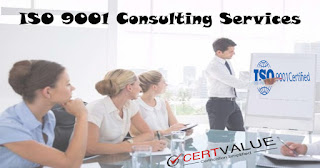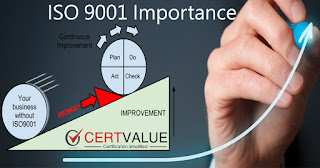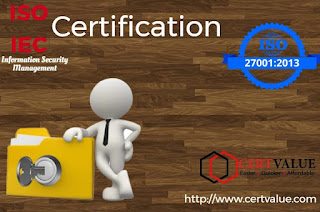How to choose an ISO 9001 consultant
ISO
9001 Certification in Bangalore, but lacks the internal
skills to see the project to completion, then a likely course of action may be
to engage the services of a consultant. Consultants come in all shapes and
sizes, and the happiest choice is the one who best meets your specific needs.
You might be thinking: “How do we even know what our needs are?” This article
provides some guidance on how to make the best possible decision for your
organization. The answers to the following questions will help you get there.
What’s
the price tag:
This will be a key consideration in most
organizations. So, if consultant A quotes 50% of consultant B, does that mean
you should definitely pick A? Most of us will agree that the answer is “Not
necessarily,” because we all know that cheaper options sometimes turn out to be
a costly letdown and send us back to the drawing board. But since resources are
always finite, we do have to operate within the confines of a budget. The price
decision must be made within the context of the following considerations.
What
business are you in:
ISO
9001 Services in Bangalore is about process
management, a consultant must have a good understanding of the processes of
your business in order to help you build an effective system. Incoming
consultants will always start by familiarizing themselves with your business
processes. For this reason, a consultant who has experience in your industry is
obviously a better choice. The one starting with zero knowledge will have a
steeper learning curve, and it will most likely be on your time.
How
long has the consultant been doing this:
ISO
9001 Consultant in Bangalore a consultant with ten
years of experience is likely to be very familiar with how to implement ISO
9001 and all the steps involved in the certification process. This means the
shortest possible implementation time for you and fewer costly mistakes. In
fact, an experienced consultant who is an industry outsider may well be a
better bet than a newbie who has worked in your industry. This is because there
is value in knowing the implementation and certification steps and how to avoid
the pitfalls. Having said that, the younger newbie is likely to be savvy with
new concepts, such as ways of managing documentation in the age of digitization.
It’s a delicate balance.
A case in point: I once encountered an organization
that had been preparing for certification for several years under the guidance
of a consultant. (This timeline alone was a red flag!) During this time the
standard was revised to the next version. (ISO standards are subject to
revision every 8 years or so. When a new revision is issued, a transition
period is set during which the old standard remains valid and auditable. After
that it becomes obsolete.).
What
is the consultant’s plan:
ISO
9001 Implementation in Bangalore It is also a good idea
to discuss their implementation plan: the steps and sequence to be followed,
and the level of participation required from your team. Be wary of the
consultant who asks very little of you, and promises to deliver a
ready-to-certify system. Consultants’ styles tend to vary from the ones who
like to do everything for you, to the capacity builders who grow competence in
your team. The latter involves more work for you, but delivers far greater
value than the other end of the spectrum. You should aim to have a system where
the people in the organization take ownership.@Certvalue.com.




Comments
Post a Comment